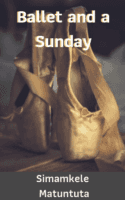“Nothing, Ma.”
“Nothing! What do you mean ‘nothing’? Did you not lie to us for half a year about being at medical school?” My dad is fuming. His frustration is palpable as he towers over my mother and his eyes fire daggers at me.
“Technically, it’s only four months. And I didn’t lie … I just … didn’t tell you I switched careers.”
“Careers? Do you call dancing a career?” He looks like a lion ready to pounce. I can see Samu has filled them in on all the details of my new life. Well, maybe not all.
“Baba, it’s ballet. It is as professional as being a doctor. I never even wanted to be in medical school. You pushed m–”
“Dancing is no career and no daughter of mine will be a dancer! What will people think?’’ he interrupts me.
First of all, this is Margate, not the rurals. Our neighbours don’t even greet us, let alone give a crap about what career path I have chosen, I think. But I don’t say that.
“I don’t want to pursue any other career outside of ballet Baba. I knew in Grade 7 that I wanted to do ballet when I saw black dancers in a magazine.”
Eight years ago, I was at the mall grabbing a snack with school friends when I picked up a ballet magazine and started paging through it. It was Pointe magazine and it was filled with pictures of dancers. And there was divine Ashley Murphy, an African American dancer from the Dance Theatre of Harlem, in New York, flying across the stage. I fell in love with all of them: ballerinas Ashley and Ebony Williams of Cedar Lake Contemporary Ballet, and Misty Copeland.
“Baba, those dancers in that magazine were from a different world, a foreign one to me, but it excited me. And then when I was in Grade 11, I saw an advert on the TV by an award-winning South African ballet dancer and choreographer, Kitty Phetla. And she was here, in my country, and I knew I could do it too.”
Baba winces in pain as though my words are a sword piercing him.
“Baba, I stuck out two semesters of medical school. I tried it but I hated it. I was miserable, Baba. That’s when I left res and joined the dance school.” I can’t stop the tears now.
Before Baba can respond the door slams and my cousin walks in. She shifts her face to form something that I could mistake as a smile, if we were friends. I turn away from her and look at my mother. I am mentally begging her to rescue me. I need her to say it out loud: that she understands where I am coming from and will talk some sense to her husband. But she has become a mute.
“And is it this dancing that has made you choose to sleep with women?” Baba asks angrily, and I can sense the disgust in his voice.
So Samu has told them everything. They know about Zuri and me. They know their daughter is bisexual. I flash my cousin a look and she turns away.
Baba is glaring, waiting for my answer. But there’s no way I will ever answer this question. From the corner of my eye, I catch my mother burying her face in her hands.
I am seething inside. How dare Baba act all mightier-than-thou and judge me? I remember him bringing women he called ‘friends’ to our home when Mom was away at work. I might have been young but I knew exactly what they did in our house. He didn’t ship me off to his sister for the weekend because he and his ‘women friends’ were ‘working’.
He was so selfish, and my mother was so distracted by her work lecturing, that they didn’t notice that as a teenager I was into both boys and girls. Unlike Samu, who was only into boys. Baba and my mother even met my second girlfriend, but they assumed she was just a friend and there was no way I was going to tell them. But now they know.
The silence is loud.
Then Baba opens his mouth to say something, but whatever he wanted to say gets stuck in his throat. He storms out and we hear the car start and drive off.
I am going to kill Samu.
***
Tell us: Have you heard of ballerina Kitty Phetla? She is an international star from South Africa. Google her! You can also find more on the American ballerinas mentioned in this chapter on the internet.


